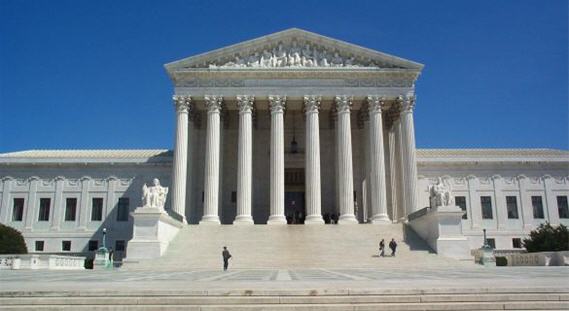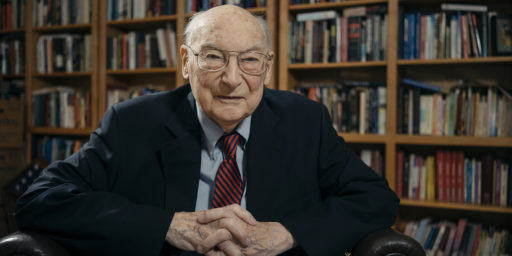72% of Americans Can’t Pick Chief Justice Out of Lineup
Even on a ridiculously easy multiple choice quiz, Americans don't know the name of the Chief Justice or the Senate Majority Leader. So what?
Linda Greenhouse passes along yet another study showing how ignorant Americans are on basic facts:
The Pew Research Center asked people this summer to identify the current chief justice of the United States from among four possibilities: John Roberts, Thurgood Marshall, John Paul Stevens and Harry Reid. Only 28 percent correctly picked Chief Justice Roberts. The late Thurgood Marshall came in second, with 8 percent. Fifty-three percent could not make a selection, answering “don’t know.”
The result was surprising; after all, people weren’t asked to pull a name out of thin air. And the alternatives to the real chief justice were scarcely plausible: Justice Thurgood Marshall died 17 years ago (or maybe people thought the question referred to Chief Justice John Marshall — he died in 1835); Senator Harry Reid has never been a justice at all; and Justice John Paul Stevens was prominently in the news this summer not for being chief justice, but for retiring.
Actually, the result isn’t the least bit surprising to anyone who has paid even the slightest attention to research into public opinion going back to, oh, Walter Lippman. People are just shockingly ignorant about seemingly obvious things like this.
And it doesn’t matter in the least! Knowing the name of the Chief Justice and a dollar will get you a cup of coffee at McDonald’s. If you can also name any of the associate justices, you get a free creamer and swizzle stick.
SCOTUS appointments are for life. There’s no advantage to keeping up with the lineups unless you travel in social circles where it’ll be water cooler conversation.
Beyond that, Americans are reasonably informed on the things about the Supreme Court that actually do matter: Their rulings on controversial issues of public policy. To be sure, they don’t quite understand how it all works. Indeed, even most journalists (not Greenhouse!) seem to think the courts are legislative bodies that pass laws. Then again, some judges seem to think that, too.
At any rate, the rest of Greenhouse’s column, which discusses how the court has shifted since Roberts replaced Bill Rehnquist — and the internal machinations that go on as Justices contemplate retirement — is worth a read. But the lead-in is a bizarre throwaway.







But if people can’t identify the Chief Justice, what hope do all the other impotent people in DC have? On the upside, it means that an Associate Justice can jump in his RV and head out for the weekend.
Seems the ruling class not only want power but also fame, which is good as it’ll make it easier when it is time to fill the Bastille.
In related news, 72% of Americans are ignorant and lazy.
What is your evidence for that?
I think it actually does. Supreme Court picks – or the standards by which they will be made, and the underlying judicial philosophies that are at issue, are often fodder for political advertising in campaigns. Parties and politicians make arguments on these issues and personalities – they ask people to vote according to their beliefs on such matters.
And, of course, judicial decision can and do have large impacts on various aspects of our lives. If the overwhelming majority of Americans don’t even know the name of the Chief Justice, then what are the odds that they have the slightest clue about any of the issues that the Court deals with? Knowing the names of the players seems like the first step in the formation of an educated opinion on the institution and the process.
Wasn’t the notion of an educated and informed citizen always one of the necessary factors in the model of effective democracy?
There’s 20-odd years of political science research on the subject showing that not only is that public aware of the politically charged decisions of the Court but that the Supreme Court loosely follows the election returns.
A lot more people know what Roe v. Wade is than know who Harry Blackmun was. And even more know that the Supreme Court has made abortion a Constitutional right.
We’re more educated and informed than ever. Certainly, moreso than we were when universal manhood suffrage was introduced. People have broad understandings of the situation and vote retrospectively.
Couldn’t pick the Chief Justice out of a line-up? Thank God we don’t have to! Hey, here in Chicago considerations like that are serious possibilities.
Can’t argue with that. But it is a rather extreme example. Beyond Roe and maybe Brown, do you really think the average person could name any other case – and give you a sentence about what it means? And I do mean the “average person” – the ones who cannot name the Chief Justice.
Are you trying to make my case for me? Even with Roe, the one case probably every person “knows” about, I don’t think most people even know what exactly the case did. It did NOT define or recognize a Constitutional right to abortion. It made reference to a previously defined right to privacy (from Griswold) and found that the government did not have the power to interfere with that right in the matter of pre-viability embryos (aligning roughly with the first trimester).
It was a decision to restrain government power in light of previously recognized rights, not the establishment of any new right. That might not make a huge practical difference in terms of how abortion laws would work, but it does represent a very different philosophy from the notion that the Court was simply making up new rights willy-nilly. Which is, of course, an oft-repeated charge in political campaigns. so the fact that most people don’t really understand what exactly the decision is based on, is very relevant to the question of how well our democracy functions.
But that’s a very high standard. I follow this stuff pretty closely and have taught ConLaw at the college level and tend not to know case names — especially the ones from recent years that I learned about through the news.
Blog comment shorthand but, really, a distinction without a difference. SCOTUS invented the right of privacy out of whole cloth in Griswold. Less than a decade later, they expanded it to a de facto right to abortion after the first trimester, later amended to before viability.
68% of all statistics are wrong.
The other 48% are misleading.
Well, was the Bill of Rights printed on whole cloth?
The Ninth Amendment states rather clearly that the rights of the people are not limited to those enumerated in the Constitution or the Amendments. Drawing on that phrase from the Declaration, rights are a natural endowment (from the Creator) and the government merely is given power to restrict certain definable rights in light of the needs to form a workable society. That, it seems to me, is the core insight that defines the American version of freedom.
Thus the Court does not make up rights. It recognizes rights – it recognizes areas where the Constitution does not allow the government to interfere with free people. That is what Griswold did – it said the government cannot interfere with the freedom of individuals to use contraceptives if they so choose. They used the term privacy to characterize this freedom, that it was a right to privacy, but that was not a made-up right, it is rather a recognition of part of that endowment that we have inherently. And it was a monumentally important recognition – what better bulwark against tyranny is there than the official recognition that the government cannot invade one’s personal private life, barring extraordinary circumstances.
On abortion as well – it is not the government or the courts granting people the right to abortion, but rather a recognition that the government should not have the power to interfere with free people in the matter of abortion, unless and until there is a recognizable, viable new human whose own rights need be considered. And as the decision lays out in great detail, the general consensus in our civilization’s history as to when that moment arises happens to roughly correspond to the embryo-fetal transition, or viability, or the first trimester.